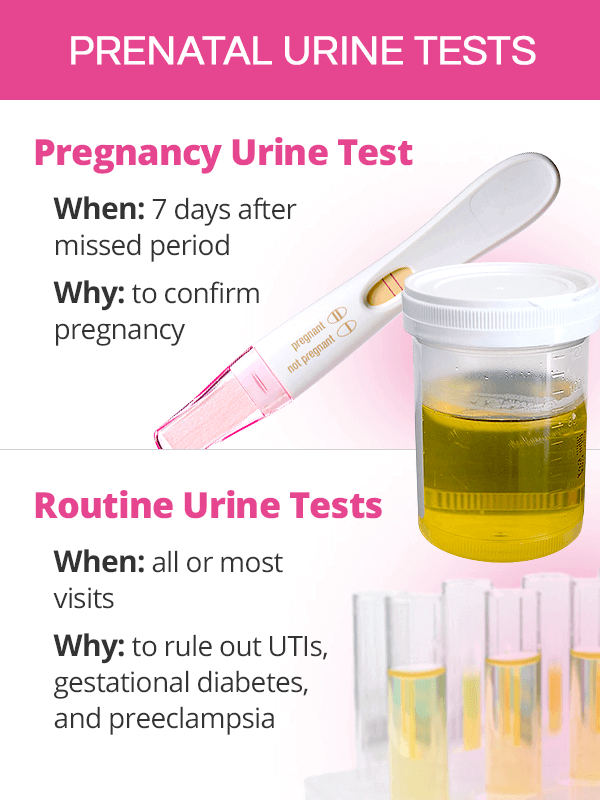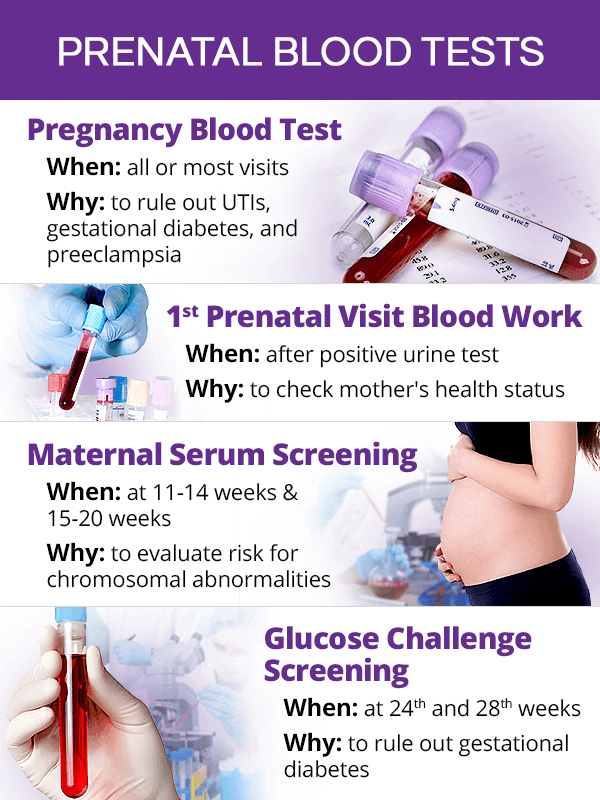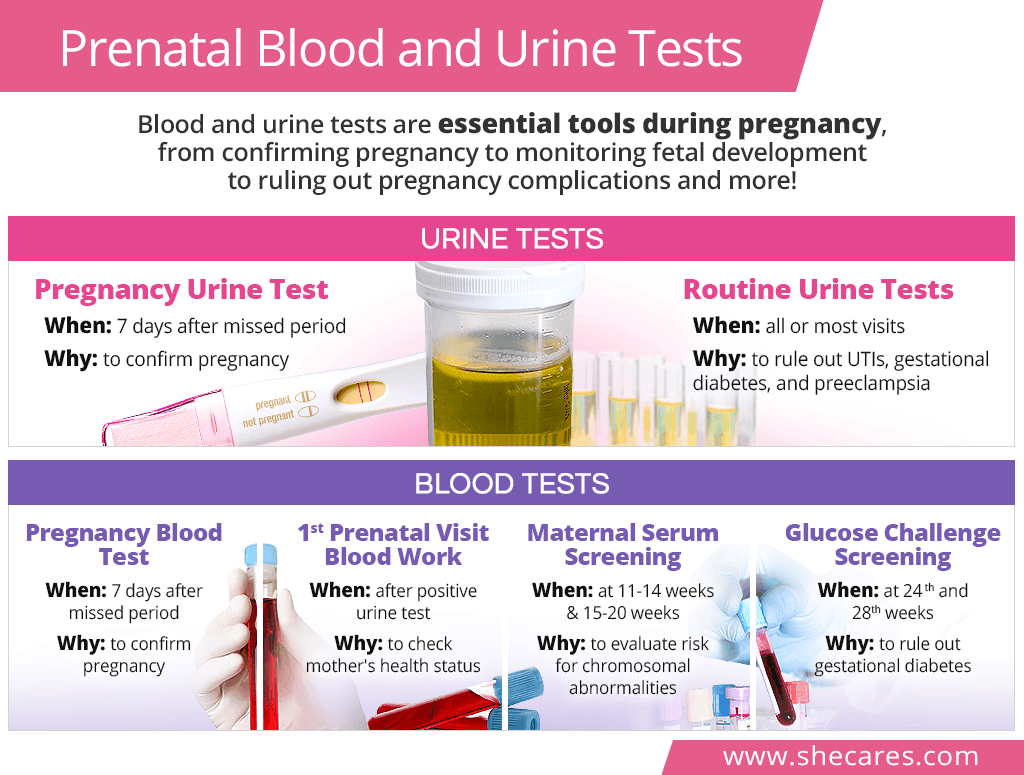Prenatal Urine Tests

A urine test, also called urinalysis, is a quick and inexpensive way to monitor a woman's health during pregnancy and catch abnormalities early on. They can include the following:
Pregnancy Urine Test
Typically, the very first test a woman takes is an at-home urine pregnancy test. Because it takes several days for the pregnancy hormone, called human chorionic gonadotropin (hCG), to be detected in urine, women are advised to take the test 7-10 days after a missed period. A urine pregnancy test will also be given to a woman at a clinic to confirm pregnancy.
Routine Urine Tests
Generally, a woman will have her urine tested at all or most prenatal visits as it provides essential clues in terms of her well-being and potential signs of complications. A urinalysis will be used to detect the presence of the following:1
Bacteria, which is a sign of a urinary tract infection
Sugar, which might be a sign of gestational diabetes
Protein, which might indicate preeclampsia
Prenatal Blood Tests

Pregnancy blood tests come at an even larger variety than prenatal urine tests. They will also be used at specific points throughout gestation or when additional needs arise. They can be categorized in the following way:
Pregnancy Blood Test
Besides taking a urine test, a woman will also be offered to undergo a pregnancy blood test that detects the presence and amount of hCG to confirm that she is pregnant. Though it can detect pregnancy sooner than urine tests (as early as 11 days after conception), they are typically done after a positive urine pregnancy test, mainly due to their higher cost.
First Prenatal Visit Blood Work
During the first prenatal visit, a doctor will take a blood sample to be comprehensively screened for the following:2
Maternal blood type: in case a woman should require a blood transfusion during pregnancy
Rh factor: a protein on the red blood cells; most people are Rh positive, which means they have the protein
Immunity to rubella, varicella, and tuberculosis from past disease or vaccination
Sexually transmitted diseases (STDs): syphilis, hepatitis B, HIV, and others, if so instructed by a doctor
Complete blood count (CBC): anemia, blood clotting, vitamin deficiencies, and overall health status
Maternal Serum Screening
Maternal blood serum is a term for a prenatal blood test that is offered to women twice during pregnancy to determine the risk for chromosomal abnormalities:3
At 11-14 weeks (first trimester): it evaluates the risk for aneuploidy (missing or extra genes), which is done with ultrasound exam called nuchal translucency as part of the “first trimester screening“
At 15-20 weeks (second trimester): also called quad screen or multiple marker screen, it screens for both aneuploidy and neural tube defects, alongside an anomaly ultrasound as part of the “second trimester screening”
Women at higher risk for chromosomal problems due to their age or family history or those with abnormal results of the first trimester maternal blood serum might also undergo a non-invasive prenatal testing (NIPT) around the 10th week. It is a new prenatal blood test that screen mother's blood for evidence of fetal chromosomal abnormalities.
Glucose Challenge Screening
Glucose challenge screening is a simple blood test during pregnancy that is performed between the 24th and 28th weeks of pregnancy to evaluate the risk for gestational diabetes.4
In the case of abnormal results, a woman will undergo another examination, glucose tolerance test, to diagnose if she, indeed, has pregnancy diabetes.
Key Takeaways
Beside prenatal ultrasounds and regular physical examinations, prenatal blood and urine tests are invaluable laboratory examinations that can provide the overseeing doctor with important cues about a woman's health, progression of pregnancy, and baby's development. They are often the first indications of developing abnormalities, which - when caught early on - can be effectively managed or treated to prevent further problems. With relatively low cost and virtually no side effects associated with urine and blood tests during pregnancy, these diagnostic tools can be done frequently for optimal prenatal care and mother and baby's well-being for years to come.
Sources
- American College of Obstetricians and Gynecologists. (2017). Routine Tests During Pregnancy. Retrieved July 18, 2019 from https://www.acog.org/Patients/FAQs/Routine-Tests-During-Pregnancy?IsMobileSet=false
- American Pregnancy Association. (2018). Understanding Pregnancy Tests: urine & Blood. Retrieved July 18, 2019 from https://americanpregnancy.org/getting-pregnant/understanding-pregnancy-tests/
Footnotes:
- American Pregnancy Association. (n.d.). Getting a Urinalysis: About Urine Tests. Retrieved July 18, 2019 from https://americanpregnancy.org/prenatal-testing/urine-test/
- Pregnancy, Birth & Baby. (2018). Blood tests during pregnancy. Retrieved July 18, 2019 from https://www.pregnancybirthbaby.org.au/blood-tests-during-pregnancy
- Stanford Children's Health. (n.d.). Common Tests during Pregnancy. Retrieved July 18, 2019 from https://www.stanfordchildrens.org/en/topic/default?id=common-tests-during-pregnancy-85-P01241
- National Health Services. (2017). Antenatal checks and tests. Retrieved July 18, 2019 from https://www.nhs.uk/conditions/pregnancy-and-baby/antenatal-care-checks-tests/
